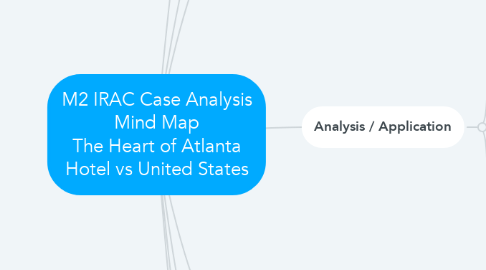
1. Influence
1.1. Businesses that rely on interstate commerce would have to stop discriminating based on race.
1.2. Since the disruptive effect of racial discrimination was addressed the amount of new business that might have been prohibited would now add economic stimulus to said market.
2. Facts
2.1. Parties
2.1.1. HEART OF ATLANTA MOTEL, INC.
2.1.2. UNITED STATES
2.2. What Happend
2.2.1. Heart of Atlanta Motel, Inc. refuses to allow African American to stay at their motel and stated they would continue to prohibit African Americans as guest. They filed suit arguing that Title II of the Civil Rights Act of 1964 was beyond the power of Congress. The Government countered that such unavailability to African Americans interferes with interstate travel and violated commerce clause and was a violation of the 1964 Civil Rights Act.
2.3. Procedural History
2.3.1. The Complaint (Heart of Atlanta Motel) sought an injunction restraining the enforcement of Title II of the Civil Rights Act of 1964, and asked for declaratory relief of a three-judge district court which sustained the ruling and sent the case to the US Supreme Court.
3. Issues
3.1. Heart of Atlanta Motel contended that Commerce Clause enforcing Title II of the Civil Rights Act of 1964 exceeded its power to regulate commerce and violated the Fifth Amendment because it deprived the right to choose its customers and operate its business as it wishes.
4. Rule of Law
4.1. Can the Commerce Clause enforce the Civil Rights Act of 1964.
5. Analysis / Application
5.1. Plaintiff
5.1.1. The owner of Heart of Atlanta Motel filed a suit challenging Title II of the Civil Rights Act of 1964 stating that the act exceeded the power of congress, more specifically it exceeded the Commerce Clause Powers to regulate interstate commerce. Additionally, plaintiff argued that their 5th Amendment rights were violated by not being able to choose their customers and their 13th Amendment rights were violated by forcing them to participate in involuntary servitude.
5.2. Defendant
5.2.1. The Government stated that by discriminating against African Americans the Plaintiff was disrupting interstate travel which falls under the power of Congress to regulate Commerce. Additionally, the government argued that the 5th Amendment does not apply in interstate commerce and the 13th Amendment was primarily applied to slavery and the challenges it had.
5.3. Court
5.3.1. The court decided 9-0 that Congress has the right to prohibit discrimination under the Commerce Clause and that the Civil Rights Act of 1964 does not violate the 5th and 13th Amendments.
5.3.1.1. Expansion
5.3.1.1.1. The courts decision confirmed that Congress does have the power to enforce Commerce Clause and that interstate travel disruptions are within that regulatory power.
5.3.1.2. Public Policy
5.3.1.2.1. The court found that other motels, inns, lodging, restaurants, cafeteria, lunchrooms, gas stations, and entertainment venues receiving goods from interstate means or serving interstate means shall adhere to the Civil Rights Act of 1964 and the Commerce Clause.
6. Conclusion
6.1. Discrimination based on race impacts interstate travel and the commerce clause allows the government to enforce the Civil Rights Act of 1964.
7. Impact
7.1. Ingersoll & Freed v. Arlene's Flowers, Inc.
7.1.1. Arlene's Flowers refused to sell flowers to the plaintiff, a gay couple, which violated Washington's law against discrimination and Consumer Protection Act. Washington Supreme Court ruled in favor of the plaintiff, defendant sought review by US Supreme Court who remanded the WA Supreme Court's decision on June 6, 2019.
7.2. Christopher Floeting v. Group Health Cooperative
7.2.1. Plaintiff claimed sexual harassment was taking place against him from an employee of Group Health Cooperative and sued defendant for alleged sexual harassment. Court ruled in favor of plaintiff and stated employers are liable for employees sexual harassment.

